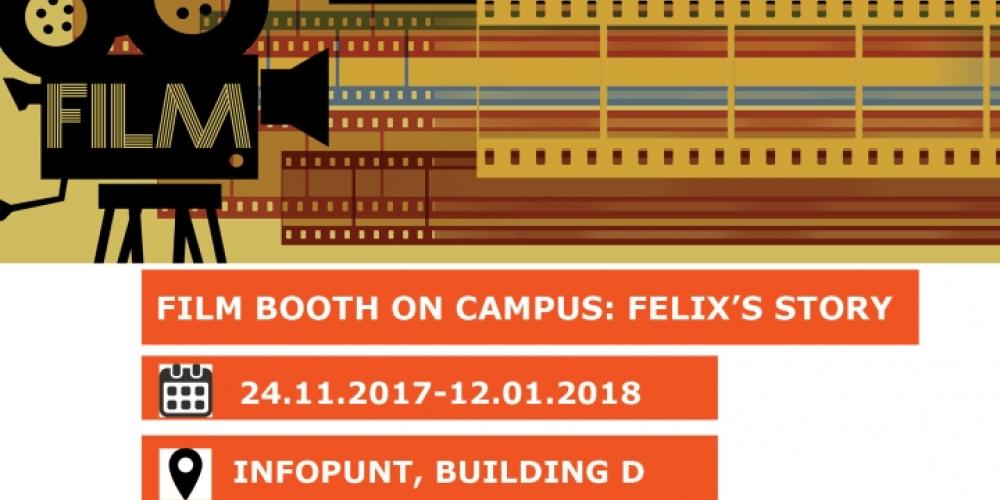
The initiative comes from the Scholars at Risk network, an international organisation which protects scholars suffering grave threats to their lives, liberty and well-being by arranging temporary research and teaching positions at institutions inside their network, as well as by providing advisory and referral services. VUB is a member, and rightly so. The university’s founding principles (Poincaré’s speech in 1918) clearly state the values and commitment in defending academic freedom, and this is exactly why in 2011 the VUB joined the Scholars at Risk network.
From 2015 till 2017 the VUB hosted Dr Felix Kaputu, a Congolese scholar who was falsely accused of supporting rebel groups in the Democratic Republic of Congo and was forced to flee the country due to inhumane treatment, which included confinement and denial of access to basic needs.
Felix’s story has been transformed into a film which will be shown on the VUB main campus from 24 November till 12 January. The booth where you can sit on a small bench, watch and through headphones listen to Felix’s story, will be located at the Infopunt in building D.
So, what is Felix’s story? Well, obviously we want you to go and check it out in the film booth, but here’s a quick summary:
Felix was a professor in literary studies at the University of Lubumbashi and kept himself away from the country’s politics. Then suddenly one day he was asked by the security forces to ‘drop by’. Several weeks later he was still there, detained in a filthy cell, accused of having supported the rebel militias. Falsely accused, obviously. After four months of campaigning by his friends abroad, he was released, but the threats continued. Through a friend he was brought into contact with the Scholars at Risk network, who got him out of Congo and found him a position first at Harvard University, and then in Belgium at the Vrije Universiteit Brussel and Ghent University until 2017 where he obtained a PhD.
The VUB also provided shelter to two other scholars at risk in two partner institutions in France and the Czech Republic (VUB’s International Relations office coordinated the project enabling this).
Being a member of the Scholars at Risk network means taking action both at the departmental and leadership level of the university. It also means raising awareness, publicly taking a stand to protect higher education values and academic freedom, participating in advocacy campaigns (petitions, letters of appeal, etc.), and organising events and seminars.
This is why this film booth is so important: to spread the message and tell Felix’s story, because, as Felix says himself: “Western institutions, their lecturers and their students, do not fully appreciate just how important and valuable academic freedom is. It is vital not just for study and research purposes, but for society as a whole. Universities are part of society. They help to prepare students for the wider world – academic freedom is an essential value which we must protect.”
On 29 November, the VUB’s International Relations office is organising a full day conference on ‘Engaging Values, Education and Responsibilities (EVER): Refugees and Migration - the role of higher education institutions’. It will include a keynote speech by Robert Quinn, Executive Director of the Scholars at Risk network. For more information, the programme and registrations: http://www.vub.ac.be/events/2017/doctor-honoris-causa-day-ever-engaging-values-education-and-responsibilities-refugees
On 30 November, the VUB’s International Relations office is facilitating an interactive workshop organised by Robert Quinn from the Scholars at Risk network on “Promoting higher education values in turbulent times” from 12:00 to 14.30. More information and registration: http://www.vub.ac.be/events/2017/doctor-honoris-causa-day-ever-engaging-values-education-and-responsibilities-refugees